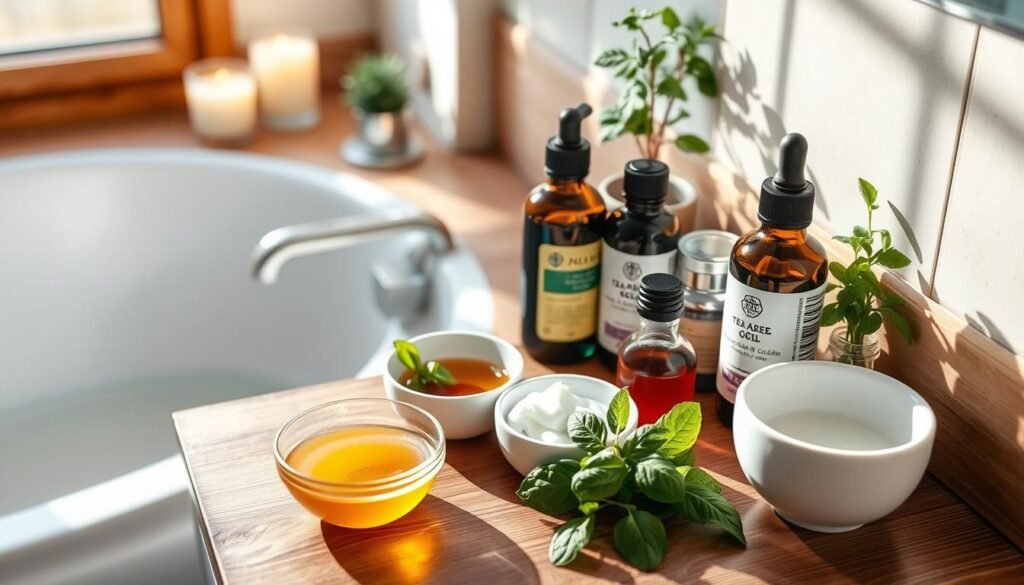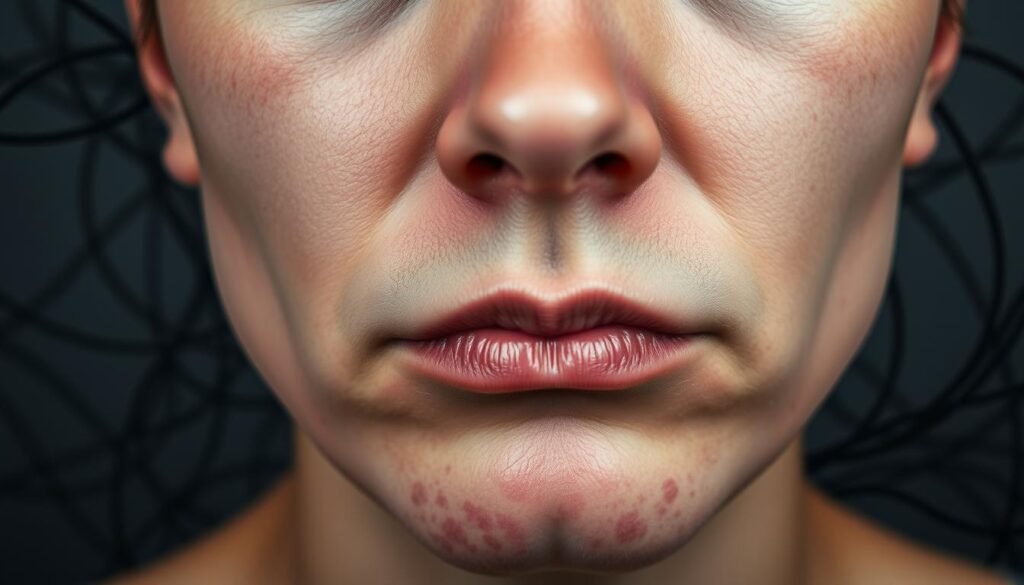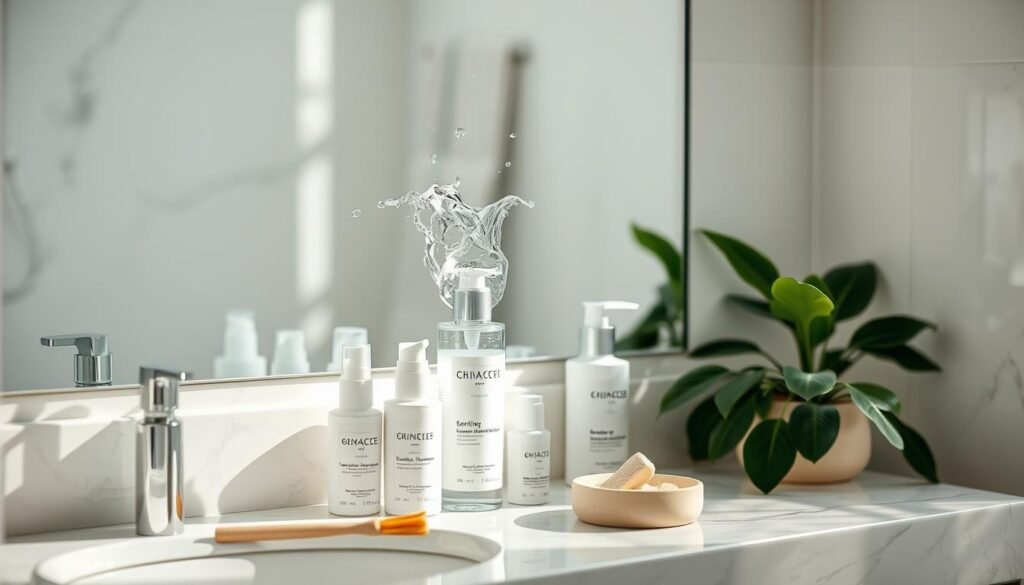Did you know about 85% of women have acne before their periods? It shows how hormonal changes can lead to chin acne. The chin is often hit hard by pimples and cysts. This is due to hormones, genes, how we clean our skin, and even hair care products.
The chin acne meaning is critical to know for better skin care. Chin acne isn’t just annoying; it also points out deeper issues. Knowing what triggers it, like stress or what we eat, helps. This way, you can create a personal skincare routine. It will tackle jawline breakouts and cystic chin acne.
For deeper understanding on chin acne and how to treat it, click here.
Key Takeaways
- Chin acne often links to hormonal changes, requiring regular checks.
- Knowing the causes of chin pimples aids in better skin care.
- Your diet and lifestyle have a big impact on hormonal acne on the chin.
- Learning about your genes can help understand ongoing jawline acne.
- There are useful topical and oral treatments available.
What is Chin Acne?
Chin acne is when you get pimples on your chin. It happens when your oil glands make too much oil. This oil, dead skin, and bacteria block pores. It can create whiteheads, blackheads, and sore cysts. Knowing about chin acne helps with better treatment.
Many things cause chin acne, and it changes by person. Hormones play a big role, especially in women. These changes can make red, sore pimples on the chin and jaw. Your lifestyle and what you eat can also affect acne. To learn more, check out this resource.
Stress doesn’t make more oil but can make acne worse. Health issues like PCOS increase oil because of hormones. Understanding chin acne helps manage it and spot other health problems.
Chin Acne Meaning
Chin acne happens mostly on the chin and jaw. It can come from many things like hormones, how we take care of our skin, what we eat, and stress. It’s key to know the chin acne meaning to handle it well. Knowing what causes it can help change how we take care of our skin and our daily habits.
Definition of Chin Acne
Chin acne is a type of acne that shows up on the lower face. It’s often linked to hormone changes, mainly in women. These changes can be during their period or when they’re pregnant. This means treatments for chin acne need to be specific to these hormonal shifts.
Significance of Understanding Chin Acne
It’s important for people with chin acne to understand it. Knowing the causes can lead to better treatment choices. Putting together what we know about treatments with good skin care can stop more breakouts. You can learn how to manage it better here. This helps us get to know our skin better.
Common Causes of Chin Acne
Chin acne often shows up as painful pimples from different sources. Knowing the causes helps tackle them well. The main reasons are hormonal changes and bacteria blocking pores.
Hormonal Fluctuations
Hormonal shifts are key in causing acne on the chin. These changes are common in women, during specific times. Times like puberty, menstrual cycles, pregnancy, and menopause can trigger them. An increase in androgens boosts sebum, leading to breakouts. PCOS can also make chin acne worse.
Pore Blockage and Bacteria
Blocked pores are a major cause of chin acne. Excess oil, dead skin, and bacteria can clog pores, causing inflammation. Overactive sebaceous glands lead to clogged chin follicles, creating painful blemishes. Keeping a good skincare routine, with regular cleansing, fights this acne type. For more on chin acne causes, consider also your environment and lifestyle.
Hormonal Acne on the Chin
Hormones play a key role in skin health and dealing with chin acne. This acne is often due to androgens. These increase sebum and cause pore blockages. People usually find their acne worsens around their period. It can be persistent, especially with hormonal changes from menopause or PCOS.
Impact of Hormones on Skin Health
Young women often see more hormonal chin acne. Between 39-85% have more acne before their period. Hormones raise sebum production and make skin inflammation worse. This makes the chin and jawline more affected. Androgens are a big part of this problem. This acne is deep, painful, and might need special treatment.
Conditions Related to Hormonal Acne
Underlying hormonal imbalances can cause cystic chin acne. Women in their 20s may have these breakouts due to hormonal patterns. PCOS can also make severe acne more common. Treatments may include oral contraceptives and androgen blockers like spironolactone. These can offer relief in up to 85% of cases after months. Mixing lifestyle changes with these treatments can help manage symptoms better. For more on hormonal acne influences, see this resource.
Genetic Factors Influencing Chin Breakouts
Genetics play a big role in the risk of getting acne on the chin. People with family members who have acne are likely to have similar skin issues. This is because they inherit traits that affect their skin type, oil production, and their immune system’s ability to fight off genetic acne predisposition. We can see this pattern when we look at how often and how severe acne is in families.
A study showed that a person with a close family member who has adult acne is more likely to have it too. This research looked at people over 25 and found genes play a big role. In families where both parents had bad acne, their kids are more likely to have acne too.
However, things like pollution and hormones can make acne worse. For women, changes in their hormones because of their period or conditions like PCOS can lead to more breakouts. How we live, including our diet and how we take care of our skin, also affects acne. All these factors together make acne a complex issue.
Knowing about our genes can help us choose better skin care. By understanding our family’s history with acne, we can pick treatments that work well for us. It’s important to think about our family history when dealing with acne on the chin. For more on how social and environmental factors affect acne, look at this study.
Role of Diet in Chin Acne Development
Diet affects our skin health, especially with chin acne. Changing what we eat offers clues on controlling breakouts. Foods high in sugar can make chin acne worse. This happens because they can cause insulin levels to spike. A spike in insulin increases sebum production, paving the way for acne. Making smart food choices might help tackle this problem.
Foods that Contribute to Acne
Studies have pointed out foods that might cause acne. Dairy, especially skim milk, is linked to more severe acne. People who drink a lot of milk tend to have more chin acne. Sugary drinks and processed foods high in carbs also worsen acne conditions. Avoiding these foods could help manage chin acne better.
Understanding Glycemic Index and Acne
The glycemic index (GI) is key in understanding acne. Foods with a high GI can make blood sugar levels spike. This increase can lead to more acne. A study showed a clear drop in acne when patients ate low-GI foods. Including foods like whole grains, fruits, and vegetables in your diet helps. They keep your blood sugar stable and your skin healthy.

| Food Type | Impact on Acne | Recommended Alternatives |
|---|---|---|
| High-glycemic foods | Increase breakouts | Whole grains, legumes |
| Dairy (skims milk) | Worsens chin acne | Almond milk, oat milk |
| Sugary beverages | Triggers hormonal response | Water, herbal teas |
| Processed snacks | Promotes inflammation | Nuts, fruits |
In summary, diet adjustments and understanding the glycemic index are important for managing chin acne. A balanced diet could be a key to healthier skin. It might also reduce breakouts, aiding in finding effective chin acne remedies.
Chin Area Acne Reasons Beyond Hormones
Chin pimples aren’t just about hormones. The environment and how we care for our skin are big factors too. Things like pollution and what we’re allergic to can make skin worse. Not taking proper care of our skin can also lead to more breakouts. So, understanding these can help tackle chin acne better.
Environmental Factors
Pollution and allergens are big reasons for chin acne. They can block pores and make skin red and pimply. People in cities may suffer more because there’s more pollution there. This shows how our surroundings impact our skin health.
Skin Care Practices
Taking care of our skin is key in fighting chin acne. A good skincare routine can shield our skin from bad environmental effects. Here are some tips:
- Using non-comedogenic products.
- Avoiding touching the face to limit bacteria.
- Washing bedsheets and pillowcases often to keep bacteria away.
- Using products with salicylic acid or benzoyl peroxide to clean pores well.
- Keeping skin moist with products good for acne-prone skin.
Knowing how our environment and habits affect our skin can guide us. This way, we can prevent chin acne better.
How Stress Affects Chin Acne
Stress plays a big role in making chin acne worse, especially the kind linked to hormones. Stress by itself doesn’t cause acne. But, it boosts cortisol, leading to more oil and clogged pores. This makes acne flare-ups worse.
About half to 80% of people say their acne gets worse with stress. Stress can slow down the healing of acne. It makes it last longer and get worse. This shows how stress and chin acne are linked.
Managing stress well can help control acne. Doing things like meditation, working out, and deep breathing helps. Keeping up with these habits is good for overall health and fighting hormonal chin acne.
A study with over 3,300 women found nearly half linked their acne to stress. Some even had acne start in adulthood. So, reducing stress daily is key. Products containing salicylic acid can also tackle stress-induced acne outbreaks.

Creating a supportive network and getting enough sleep helps against stress too. These actions work together for healthier skin and less stress-induced chin acne.
Effective Treatments for Chin Breakouts
Chin acne is tough, but you can beat it with the right methods. Combining creams, pills, and changes in daily habits can greatly improve your skin. Getting to know these treatments will let you take charge and get clearer skin.
Topical Treatments
Top creams are the first step to fight chin acne. benzoyl peroxide helps by reducing swelling and killing germs. Salicylic acid cleans out oil and dead skin, stopping pores from getting clogged. Retinoids boost skin renewal, leading to healthier skin and less acne.
Oral Medications
For tough acne, pills might be needed. Doctors often suggest antibiotics like clindamycin, more so when used with creams. Treatments for hormone-related acne, such as spironolactone, balance your hormones to control acne. Isotretinoin can shrink oil glands, making breakouts less common.
Lifestyle Changes and Home Remedies
Making changes in your life is key to dealing with chin acne. A good skincare routine keeps your skin clear. Trying home treatments like tea tree oil and aloe vera can also help because they’re natural germ fighters. Cleaning your face regularly and not touching your chin will help keep germs away.
| Treatment Type | Description |
|---|---|
| Topical Treatments | Benzoyl peroxide, salicylic acid, and retinoids for acne management. |
| Oral Medications | Antibiotics and hormonal treatments to combat severe breakouts. |
| Lifestyle Changes | Consistent skincare routine and home remedies for supporting acne treatment. |
For anyone struggling with chin acne, trying both medical and daily life solutions can make a big difference. Knowing and using the right products and treatments can lead to clearer skin.
Preventative Measures for Chin Acne
To prevent chin acne, it’s important to use a mix of good skin care, diet changes, and clean habits. Good skin care, eating right, and staying clean all play big parts. These steps help keep your skin clear and stop spots linked to hormones and other causes.
Skin Care Routines
Starting a regular skin care routine is key to stop chin spots. It’s good to use products that don’t block pores. Using things like benzoyl peroxide and salicylic acid can cut down on oil. This helps stop breakouts.
It’s also good to peel your skin regularly with glycolic or lactic acid. This helps by taking away dead skin that can block pores.
Dietary Adjustments
What you eat affects your skin. Eating foods that don’t make your blood sugar go up quickly helps with acne. Eating less sugar and processed foods keeps insulin levels steady. This is good for your skin. Eating foods with lots of antioxidants, omega-3s, and vitamins is also great for stopping chin acne.
Hygiene Practices
Clean habits are vital in stopping acne from starting. Washing your hands often and not touching your face can help. It’s important to keep things like towels, sheets, and makeup brushes clean. This stops irritation and spots. A good habit is washing your face twice a day with a soft cleanser that’s good for skin prone to acne.

| Preventative Measures | Description |
|---|---|
| Skin Care Routines | Implement non-comedogenic and exfoliating products to maintain clear pores. |
| Dietary Adjustments | Focus on a low-glycemic diet and incorporate skin-friendly nutrients. |
| Hygiene Practices | Maintain cleanliness of personal items and reduce hand-to-face contact. |
Chin Acne Products Recommendations
Finding the right products for chin acne is key to control and prevent outbreaks. There are different types suited for various skin types and concerns. Choosing the correct items can greatly influence the success of treating chin acne.
Top Products to Consider
When searching for the best chin acne solutions, consider these options:
- Benzoyl Peroxide: With strong antibacterial effects, it greatly reduces acne bacteria.
- Salicylic Acid: This ingredient dives deep into pores to clear them and peel the skin.
- Retinoids: They aid in renewing skin cells and stop new acne from forming.
- Non-comedogenic Moisturizers: Vital for keeping skin moist without causing acne.
- Gentle Cleansers: Designed to cleanse without stripping away needed moisture, avoiding more irritation.
Ingredients to Look For
In choosing products for chin acne, focus on ingredients effective against breakouts:
- Salicylic Acid: It softly peels the skin, lessening blackheads and whiteheads.
- Benzoyl Peroxide: It’s great for treating breakouts quickly.
- Ceramides: These are crucial in fixing the skin’s barrier, especially with strong acne treatments.
Conclusion
Understanding what causes chin acne is key for handling it well. Acne affects 35% to over 90% of teens, showing it’s a widespread issue. Both hormones and lifestyle have big roles in causing these breakouts, so knowing what triggers yours is important.
Looking into how diet, genes, and the environment affect acne helps in taking action. There are many ways to treat chin acne, including creams and changing habits. A good skin care routine also helps a lot, making your skin clearer and boosting your confidence.
Dealing with chin acne is different for each person. Knowing about hormones and other causes helps in finding the best ways to treat it. This knowledge leads to a custom skin care approach, making clear skin a realistic goal for everyone.